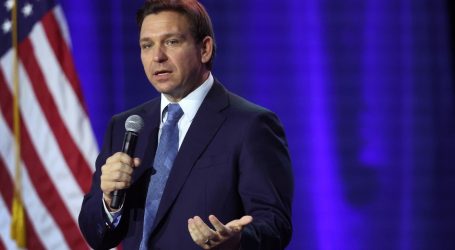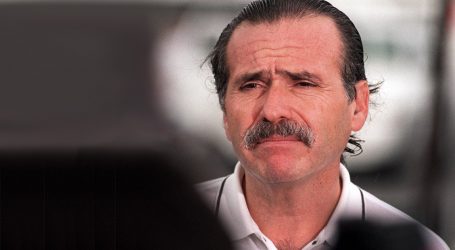Trump Whitewashes The Civil War
Donald Trump seems to lack even a cursory knowledge of American history.
In a recent interview with the Washington Examiner, Trump said Andrew Jackson, the slave-owning and genocidal seventh president, didn’t like what was happening with the Civil War, lamenting,“I mean, had Andrew Jackson been a little later, you wouldn’t have had the Civil War. He was a very tough person, but he had a big heart. He was really angry that he saw what was happening with regard to the Civil War. He said, ‘There’s no reason for this.’ People don’t realize, you know, the Civil War — if you think about it, why? People don’t ask that question, but why was there a Civil War? Why could that one not have been worked out?”
It was an odd statement given Jackson had been dead for 16 years before the war started on April 12, 1861 and ended on May 9, 1865 with the surrender of Gen. Robert E. Lee.
To be fair, I can’t say that I would expect the average person to know a lot about Jackson. However, most Americans should have a firm grasp of the the causes of the Civil War, and the names of its key players. While not every U.S. president was an Ivy League graduate or college professor, it wouldn’t be controversial to surmise that a president’s historical knowledge should be above average, especially if he or she decides to evoke the name of a historical figure to make a point. It’s not clear how Trump’s Republican and conservative acolytes can justify his bizarre misstep beyond, “C’mon, give him a break!” and “Oh no Baby, what is you doin‘??”
Trump’s way of thinking
Historian Jon Meacham, author of the Jackson biography American Lion, offers an anecdotal explanation for Trump’s misstatement, suggesting during a recent interview on MSNBC that the president’s mind functions much like a pinball machine.
“Sometimes you would roll the ball, it would bounce out and it would hit the pin ball machine,” Meacham says, according to a NewsOne transcript of the interview. “And that’s basically what it’s like inside Donald Trump’s mind, I think.”
Meacham went on to answer Trump’s question about why a deal could not be struck to prevent the Civil War, noting that President Abraham Lincoln was willing to compromise with the South and allow slavery to stand in the states where it existed. Lincoln, however, drew the line at allowing it expand westward. But the South ultimately felt the walls closing in and began to secede.
“But that’s the fundamental cause of what [American historian] Shelby Foote called the crossroads of our being, the Civil War,” Meacham says. “It was the continued existence and possible expansion of slavery. It’s so important, it’s beyond, I think, being a source of a sort of half-hearted musing.”
Indeed, Trump’s ahistorical ramblings is a reminder that we live in a country that holds two very distinct versions of American history.
Trump as Jackson
Trump’s advisors, former Breitbart News executive chairman Steve Bannon and former New York City Mayor Rudy Guiliani, have compared Trump to Jackson. Jackson was considered an avid unionist who fought for the common man against big and corrupt government, so they are trying to imply that Trump has that same type of empathy and strong leadership traits. But for an administration that swears it is trying to bring the country together and reach out to all Americans, comparing this POTUS to Andrew Jackson is glaringly odd choice.
Jackson owned over a hundred slaves, and amassed his wealth from their sweat, blood, and free labor. He also signed the Indian Removal Act in 1830, leading to what has been widely known as “The Trail of Tears”. And interestingly enough, he allegedly believed that the Earth was not round.
Though Jackson was a complex figure, many Americans do not hold the same nostalgia as Trump or the Republican Party of the slave-owning former president who expanded the forced relocation and genocide of Native Peoples. Though Trump’s comment highlights his ignorance, he is not the first conservative or Republican in recent history to try to whitewash America’s brutal history.
Last year, ex-Fox commentary Bill O’Reilly quipped that Black slaves who built the White House were well-fed. In 2012, Republican presidential candidates Michele Bachmann and Rick Santorum came under fire for signing a pledge asserting that life for African Americans was better during slavery than after the election of Barack Obama, because they were “more likely” to be raised by a mother and father. Art Robinson, a publisher and a GOP candidate for congress in Oregon, sold and promoted the books of George Alfred Henty, a racist writer who evaluated slaves as “probably a happier class of people than the laborers upon any estate in Europe.”
In the words of playwright Lorraine Hansberry, “We’ve been trying very hard. . .in America to pretend that this greatest conflict didn’t even have at its base the only thing it had at its base. . . Person after person will write a book today and insist that slavery was not the issue.”
So Trump’s musings that a deal could have been struck to prevent the war is just more alternative facts propagated by his administration. It’s sad that even in 2017, we are still holding debates about whether the Civil War was about slavery. Trump argues said that “people” are asking why the war happened, and that is actually not entirely untrue, which is both sad and frustrating.
That being said, I would have never would have guessed that the President of the United States would not have even an elementary knowledge of American history.
Joshua Adams is a writer and arts & culture journalist from Chicago. His writings often explain current and historical cultural phenomena through personal narratives – @JournoJoshua
SEE ALSO:
Donald Trump & Mediocrity Of Privilege
‘I Am Not Your Negro’ Doc Gives Baldwin’s Voice New Life
[ione_media_gallery id=”3645486″ overlay=”true”]




